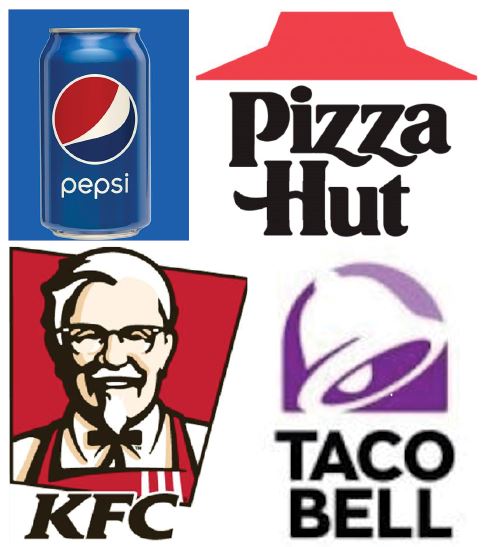
More Places To Boycott
By Karen Schumacher
Yum! What is better than having a pizza delivered by Pizza Hut for those fall football games. How about when planning a picnic or Mom is getting off late from work, dropping by and getting a bucket of that Kentucky Fried Chicken (KFC) with all the trimmings to feed the family, everyone loves that. When out and about running errands, and for a different change of pace, how do those Taco Bell burritos sound? In fact, you can go to Taco Bell in the morning for breakfast before you hit the road!
KFC is an exemplary example of the American dream. Starting out in Corbin, Kentucky during the depression, Harland David Sanders, opened a roadside restaurant and sold fried chicken. He later figured out that having a franchise would expand his business and in 1952 he opened one in Utah. This brainchild was so successful he was able to sell his business in 1964 for $2 million dollars. He did all of this in spite of dropping out of school in the 7th grade, having been raised during a time when kids were actually educated. There is no finer example of what America is about and Colonel Sanders remained an American icon. After several changes in ownership, KFC was bought by Pepsi-Co in 1986.
Taco Bell started out similarly. In 1946, a 23-year-old WWII Marine veteran, Glenn Bell, noticed long lines of customers at a near-by Mexican restaurant and decided to start selling similar food at his hot dog stand. By 1962 he opened his first Taco Bell, starting a franchise in 1964, and the rest is history. He sold out to PepsiCo in 1978.
Pizza Hut was started by two brothers in 1958, Frank and Dan Carney, Dan being an Air Force veteran. Without any formal education on franchising Dan studied KFC and McDonalds franchise methods. In fact, already having a business degree, he went on to get his Master’s degree, wanting to write his thesis on the subject, but that idea was rejected by his obviously more knowledgeable professor. Later, without that degree, he was told he should teach a class on the subject. PepsiCo bought Pizza Hut in 1977.
In 1997, PepsiCo spun its restaurant holdings as Tricon Global Restaurants Inc., and in 2002 Tricon changed its name to Yum! Brands while acquiring Long John Silver’s and A&W. In 2011, Yum! sold A&W and Long John Silver’s to A Great American Brand because it wasn’t enough of a money maker for them, instead making big bucks in China and other countries.
PepsiCo has had a long standing relationship with the United Nations (UN) such as in the UN Global Compact, and is a current member of the UN World Business Council on Sustainable Development (WBCSD). In 2007 Yum! joined forces with another UN organization, UN World Food Programme (WFP), to raise global hunger awareness and money for the WFP, funded by the raised cost in the food you buy. It is part of their Environment, Social, Governance (ESG) metrics. Both the Global Compact and WBCSD expect a commitment to advance UN goals and objectives. Pepsico and Yum! are also World Economic Forum (WEF) partners.
Yum! has several policies that support the UN Sustainable Development Goals (pg 12) such as its commitment to climate change, sustainable packaging reducing waste (12.5), global citizenship, equity and inclusion, and global forest stewardship. These are policies that cost them nothing as that cost is passed on to those who buy their food. Other YUM! actions that consumers pay for are investments in green buildings, accelerating renewable energy, and accelerating the transition to a zero-carbon energy future.
These fast-food chains have been part of the American lifestyle since the early 60’s. All were started by men who reached for and achieved the American dream, not always with an education, but with freedom, hard work, and with a keen desire to learn, they became successful.
So the next time you enjoy that fried chicken, taco, or pizza, remember these American men who started the path to your culinary enjoyment. Then pause and think about how the face of America is being changed by these UN and WEF global corporate partners, and whose goal is nothing more that to reshape the world into a global society under the guise of sustainable development, with you paying for all of it.
It is disheartening to know these iconic American fast food chains, built by American men, are used as pawns to push an ideology that is the antithesis of America.
What would Harland, Glenn, Frank, and Dan think? In honor of those men and what they built for America, maybe consideration should be given to boycott these WEF owned chains and stop contributing to their ESG agendas. Put your money into a local Mom & Pop shop.